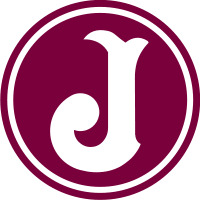Clube Atlético Juventus
 | |||
| Full name | Juventus | ||
|---|---|---|---|
| Nickname(s) | Moleque Travesso (Prankster Boy) | ||
| Founded | April 20, 1924 | ||
| Ground | Rua Javari | ||
| Capacity | 4,000 | ||
| President | Antonio Ruiz Gonzales | ||
| Head coach | Alex Alves | ||
| League | Campeonato Paulista Série A2 | ||
| 2021 | Paulista A2, 10th of 16 | ||
| Website | Club website | ||
|
| |||
Clube Atlético Juventus (Latin for Youth), commonly referred to as Juventus da Mooca or simply Juventus, is a Brazilian professional football club in the district of Mooca, São Paulo, that competes in Campeonato Paulista Série A2, the second tier of the São Paulo state football league.
Although it was a Campeonato Brasileiro Série B (Taça de Prata) winner once, Juventus nowadays competes only in tournaments in the state of São Paulo, such as the Campeonato Paulista.
The team typically plays in maroon shirts and white shorts, and is nicknamed Moleque Travesso (the Prankster Boy).
History[]
Clube Atlético Juventus was founded on April 20, 1924 by Cotonificio Rodolfo Crespi employees, as Extra São Paulo.[1] The team colors were the colors of São Paulo state, black, white and red.[2]
The club changed its name to Cotonifício Rodolfo Crespi Futebol Clube in 1925,[1] and in 1930, the club changed its name again, to Clube Atlético Juventus,[2] because Count Rodolfo Crespi was a supporter of Juventus of Italy,[3] but the team colors are a homage to Italian club Torino Football Club,[4] because Rodolfo Crespi's son, Adriano, was a supporter of the club from Turin.[3]
Pelé states his most beautiful goal was scored at Rua Javari on a Campeonato Paulista match against Juventus on August 2, 1959.[5] As there was no video footage of this match, Pelé asked that a computer animation be made of this specific goal. This animation can be seen on Pelé Eterno, a documentary about his career.[6]
The club won the Copa FPF for the first time in 2007, after defeating Linense in the final,[7] and also competed in that season's edition of Recopa Sul-Brasileira.[8] Juventus was eliminated in the Campeonato Brasileiro Série C 2007's first stage.[9]
Achievements[]
Professional competitions[]
- Campeonato Brasileiro Série B:
- Winners (1): 1983
- Campeonato Brasileiro Série C:
- Runners-up (1): 1997
- Copa FPF:
- Winners (1): 2007
- Campeonato Paulista Série A2:
- Winners (2): 1929, 2005
Youth competitions[]
- Copa São Paulo de Futebol Júnior:
- Winners (1): 1985
Stadium[]

Juventus' home stadium is Estádio Rua Javari, inaugurated in 1929, with a maximum capacity of 4,000 people.
Juventus in other years[]
Notable coaches[]
Symbols[]
The anthem's author is Carlos Alberto de Jesus Polastro.[10]
The club is nicknamed Moleque Travesso, meaning the Mischievous Boy. The nickname was first used on September 14, 1930, by the journalist Thomaz Mazzoni, after Juventus beat Corinthians 2–1 at Estádio Parque São Jorge, which was Corinthian's home stadium at the time.[3]
Rivals[]
Juventus biggest rival is Nacional[citation needed]; the games between the two clubs are called Juvenal. Because of the poor performances of both teams on their championships, they've been relegated to different divisions and cannot play a match between them, since 2007. However, in 2014 Nacional AC was promoted from Second Division to Division A3, where Juventus has been played for a couple of years leading to a recent edition of the Juvenal in April 2015. Portuguesa is another direct rival of Juventus. Their matches are known as The Immigrants' Derby (Italians vs Portuguese).
References[]
- ^ Jump up to: a b "Juventus – A trajetória do Moleque Travesso" (in Portuguese). Veja São Paulo. Archived from the original on April 25, 2008. Retrieved September 10, 2008.
- ^ Jump up to: a b "Juventus da Mooca, o teimoso "Moleque Travesso"" (in Portuguese). Diário do Comércio. Archived from the original on March 23, 2008. Retrieved 2008-09-10.
- ^ Jump up to: a b c Enciclopédia do Futebol Brasileiro Lance Volume 1. Rio de Janeiro: Aretê Editorial S/A. 2001. p. 197. ISBN 85-88651-01-7.
- ^ "Clube Atlético Juventus – História" (in Portuguese). Federação Paulista de Futebol. Archived from the original on May 27, 2011. Retrieved September 10, 2008.
- ^ "Um gol e um soco no ar" (in Portuguese). Diário do Comércio. Archived from the original on February 26, 2008. Retrieved September 10, 2008.
- ^ "Pelé Eterno" (in Portuguese). Adoro Cinema. Retrieved July 17, 2007.
- ^ "Linense vence, mas Juventus é campeão da Copa FPF" (in Portuguese). Estadão. November 25, 2007. Retrieved September 10, 2007.
- ^ "Marcílio Dias vence Juventus e decide título no sábado" (in Portuguese). Estadão. December 5, 2007. Archived from the original on April 21, 2009. Retrieved September 10, 2007.
- ^ "Brazil 2007 Championship – Third Level (Série C)". RSSSF. December 6, 2007. Archived from the original on October 13, 2007. Retrieved 2007-09-10.
- ^ "Clube Atlético Juventus – Hino do Juventus" (in Portuguese). Federação Paulista de Futebol. Archived from the original on May 27, 2011. Retrieved September 10, 2008.
| Wikimedia Commons has media related to Clube Atlético Juventus. |
External links[]
- (in Portuguese) Official website
- (in Portuguese) Juventus Supporters website
- Clube Atlético Juventus
- Association football clubs established in 1924
- 1924 establishments in Brazil
- Works association football teams
